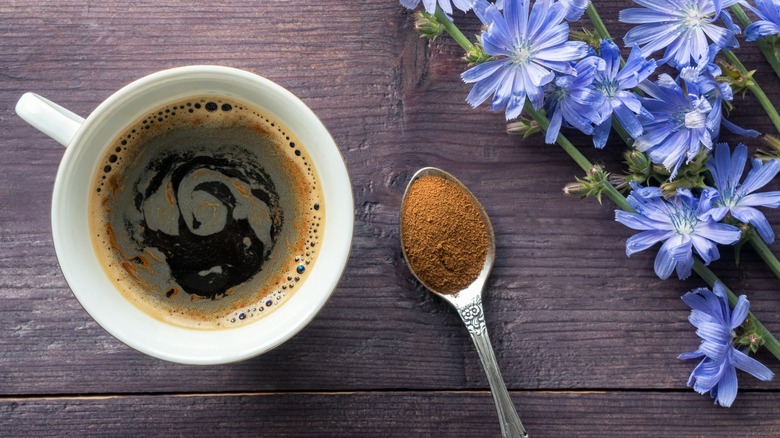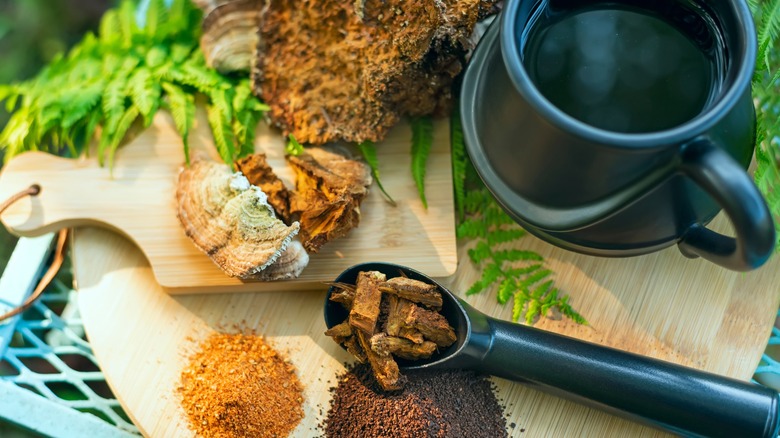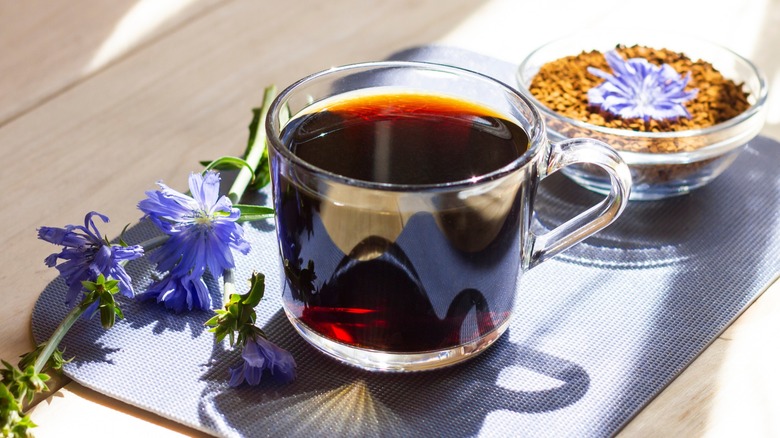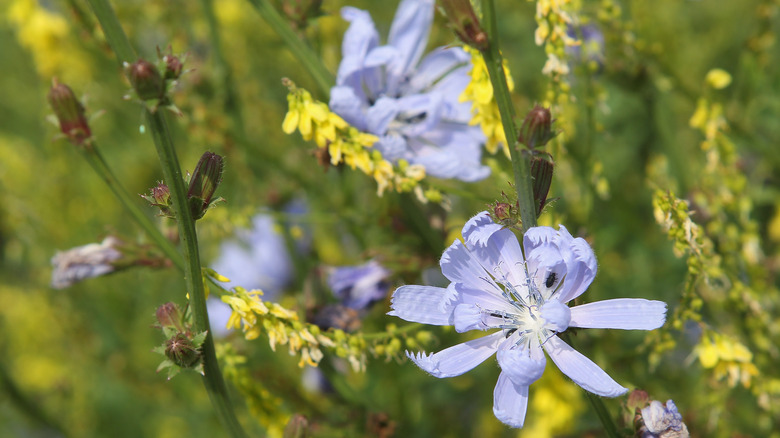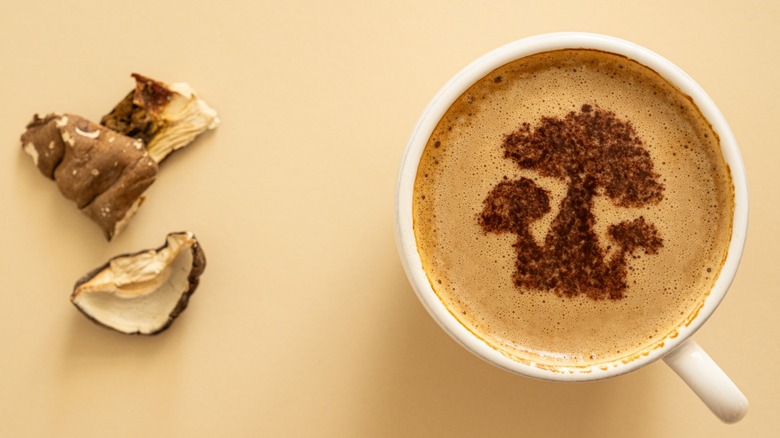The Main Difference Between Chicory And Mushroom Coffee
Allow us to set the scene: It's 1:00 p.m. and you're three cold brews deep. You're late for lunch, and it's been a busy day. But you're getting all your tasks done quite well, thank you very much. Only now, your veins are coursing with the primal anxiety of an animal being hunted for sport, and there's an audible hum emanating from your body. We're all about seizing the day, but we're also all about lowering anxiety and boosting your health — and according to the contemporary advertising market, these are things that chicory and mushroom coffees can do.
Both varieties are marketed as healthier alternatives to regular coffee. They (allegedly) both taste similar to standard drip coffee and, conveniently, you can also make mushroom and chicory coffees using your regular go-to preferred brewing method (pour-over, French press, whatevs). However, these coffee alternatives tote a unique lineup of nutritional values and health benefits — and, from a foodie perspective, pretty different flavors.
Also, neither mushroom nor chicory "coffees" are actually regular coffee ... at least, not exactly. It's complicated. Let's get into it (and for the record, we're not talking about psychedelic mushrooms, here. Unless you melt a square of psilocybin mushroom chocolate into your cuppa joe, which could be awesome).
What is chicory coffee?
If you want to cut back on the coffee jitters but wouldn't be caught dead drinking decaf, chicory might be just the brew for you. Chicory is a blue-flowering perennial plant with a root that can be ground and roasted to obtain a coffee-like beverage. It belongs to the dandelion family, but for the cousin of a bright yellow weed, chicory makes a sporting dupe for rich, deep java.
You steep the root, not the flowers or stems, and the resulting beverage is naturally caffeine-free, dark brown in hue, medium-bodied, and boasts a coffee-like nutty, bittersweet aroma and flavor. Happily for thrift-minded foodies, chicory root is also significantly more water soluble than regular coffee grounds, so you don't need to use as much of it to yield a strong, bold beverage. Combining chicory and coffee grounds has been a common practice among foodies in New Orleans for centuries.
Chicory is originally indigenous to northern Africa, Europe, and western Asia and folks have been using chicory root as a coffee substitute since early-1800s France. Foodies in Louisiana's French Quarter started brewing chicory in 1840 when their coffee bean supply was blocked by Union naval ships during the American Civil War. Today, chicory coffee remains a common menu item in NOLA coffee shops from the iconic Café du Monde to the trendy third-wave Coast Roast Coffee — and whether you're sipping it in The Big Easy or not, it's a knockout bevy.
What is mushroom coffee?
Mushroom coffee is made from a blend of ground coffee beans and ground, dried mushrooms. The resulting combination powder is brewed to produce a cup of smooth, rich coffee. The fruiting bodies of the mushrooms are dehydrated, powdered, and packaged into instant coffee packets, ground coffee blends, or K-cup-style single-serving coffee pods. Some coffee shops in New York and Los Angeles have already begun adding mushroom coffee to menus (chagaccino, anyone?). Mushroom coffee is typically made from specific types of mushrooms that fall more on the "medicinal" than the "culinary" side, such as chaga, lion's mane, reishi, or turkey tail mushroom.
In other words, you won't find sliced portobellos bobbing in your morning cuppa joe (thank God). Traditional Chinese and Ayurvedic medicines have long praised the reishi mushroom (aka Ganoderma lucidum) for its myriad of purported medicinal properties. One comprehensive 2015 study published in the Journal of Agricultural and Food Chemistry found that lion's mane mushrooms (Hericium erinaceus) contain powerful antibiotics, antioxidants, and anti-inflammatory benefits, can help prevent diabetes and cancer, regulate blood pressure, promote energy and alertness, boost mood and the immune system, and stimulate brain function.
Other proponents say that mushroom coffee eases digestion. Health reasons aside, some foodies are just into mushroom coffee for its naturally earthy yet coffee-adjacent flavor. The beverage first originated in Finland, where folks turned to steeping mushrooms as an innovative way to satisfy their daily coffee fix during World War II, when the global coffee bean store was in short supply.
Mushroom coffee contains regular coffee beans
The biggest difference between mushroom and chicory coffees is that a chicory brew doesn't have to contain any actual coffee beans, while mushroom coffee is a blend of mushroom extract and coffee grounds. This distinction also creates significant differences in both flavor and caffeine content. Chicory has a slight caramel taste, but some folks add spices like cinnamon, nutmeg, cloves, and star anise to amp up the flavor.
To make chicory "coffee," all you'll need is ½ tablespoon of ground chicory per 8-ounce cup. Brew the grounds using your preferred coffee brewing method, add any milk or creamer you desire (or none at all), and enjoy. Just take care not to over-brew, which, as with coffee, can make for a bitter taste. Blended chicory coffee, like the kind popular in New Orleans, typically uses 2 parts coffee grounds to 1 part chicory.
Meanwhile, mushroom coffee blends use a 1:1 ratio of coffee bean grounds to mushroom powder. Thanks to the naturally symbiotic flavors and equal proportions, the taste of mushroom coffee is very similar to a regular cup of coffee: dark and nutty, but with a slightly earthy, umami edge. To counteract some of the woodiness, some manufacturers add flavors or sweeteners like vanilla or hazelnut. Also, by extension, mushroom coffee packs roughly half the caffeine content of regular drip, clocking in at 50 to 60 milligrams of caffeine per cup versus the usual 100 to 150 milligrams.
Chicory coffee is more affordable
Both mushroom and chicory coffee grounds can be purchased at specialty herbalist shops and from a variety of online retailers. However, the price point is a larger factor for mushroom coffee than for its chicory counterpart. At a Walmart in New York, a 10-ounce bag of Teeccino brand Turkey Tail Astragalus mushroom coffee runs for $16.99, while a 10-ounce canister of standard Café Bustelo coffee costs just $5.37. By contrast, at that same Walmart, a 12-ounce bag of Community brand blended chicory and coffee grounds costs a tamer $7.12.
If you want to score pure chicory, 36 ounces of the stuff costs $28.99, less than $1 per ounce if you buy in bulk. For the most economical, self-replenishing store of 'em all, chicory is also easy to grow yourself. Those delicate blue flowers are deceptively hardy and able to withstand frost. It's a low-maintenance crop that spreads quickly in moist, well-drained soil. Chicory also fares well in pots for apartment-dwelling coffee lovers who might not have yard access (not to mention it just looks pretty).
Although, if you're feeling particularly scrappy, you could take a cue from the Finnish mushroom coffee-makers of the early 20th century. They harvested fresh chaga mushrooms, soaked 'em in water overnight, then pressed out the liquid and boiled them to obtain pure mushroom extract. They drank the extract on its own out of necessity — which you could also totally do, but you're probably better off stirring it into your coffee.
Mushroom coffee is a more modern phenomenon
Mushroom coffee is marketed as a superfood, and is a relatively new product compared to chicory coffee. When it comes to mushroom coffee, the keyword is "adaptogens," which are compounds that help the body handle stress. Medicinal mushroom extracts are loaded with adaptogens and innumerable accompanying health benefits ... right? While a degree of medicinal mushroom benefits have been proven by various studies, ultimately minimal conclusive research has been conducted to verify any universal validity of these purported nutritional qualities. Also, due to the high level of oxalates in mushroom extract, mushroom coffee is not recommended for folks with kidney or digestive issues.
That isn't to say that chicory doesn't boast some unique health benefits of its own. Cutting back on the java buzz is always a good thing, health-wise. In the 1800s, folks turned to brewed chicory root as a home remedy for treating common ailments like jaundice, rheumatism, enlarged liver, and gout. Chicory is also a significant source of the prebiotic inulin, which supports gut health. But, at the end of the day, chicory coffee is an old reliable beverage that gets the job done. It's thrifty, caffeine-free, delicious, and (we think) super cool, but unlike the chagaccino, it isn't "hip and trendy," per se. Also, if you're allergic to ragweed or birch pollen, chicory coffee probably isn't for you.

